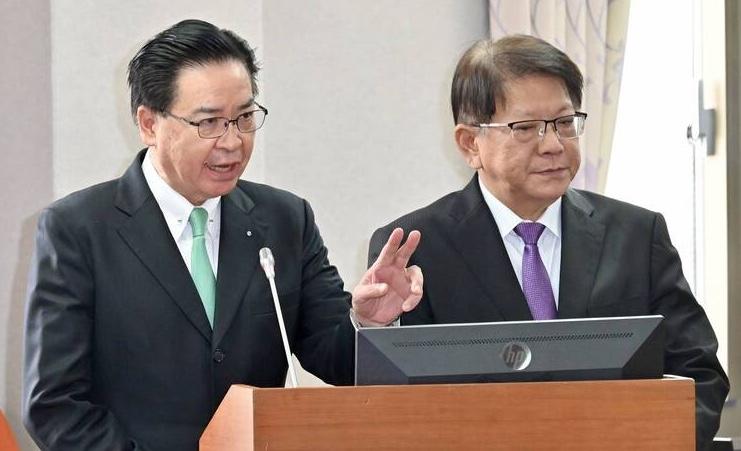Recently passed amendments to fiscal planning law could reduce the defense budget by 28 percent, undermining Taiwan’s military readiness and international support, National Security Council (NSC) Secretary-General Joseph Wu (吳釗燮) said today.
Wu, Presidential Office Secretary-General Pan Men-an (潘孟安) and Academia Sinica researcher Chen Yi-shen (陳儀深) were among those who spoke at a meeting of the Legislative Yuan’s Judiciary and Organic Laws and Statutes Committee to give remarks on the budget.
The amended Act Governing the Allocation of Government Revenues and Expenditures (財政收支劃分法), if promulgated, would result in a NT$375.3 billion (US$11.47 billion) reduction of the central government’s budget, Directorate-General of Budget, Accounting and Statistics said.

Photo: George Tsorng, Taipei Times
Other countries in the first island chain have increased their defense spending, such as South Korea increasing its budget by 4.5 percent and Japan by 16 percent, Wu said.
However, Taiwan, the nation under the most pressure, may see its budget reduced by 30 percent, he added.
This would affect military readiness and the maintenance of equipment, he said.
As other countries evaluate Taiwan’s resolve to defend itself based on the defense budget, cutting it by 30 percent would send the wrong message, suggesting that it has no intention of defending itself, he said.
In that case, no like-minded countries would help Taiwan, Wu added.
On Dec. 9, foreign media quoted high-level Taiwanese defense officials as saying that China deployed 90 vessels to the East and South China Seas surrounding Taiwan, Wu said.
These reports were confirmed, showing that China had launched large-scale naval training exercises, he added.
These recent drills show China’s ability to mobilize in adverse conditions and simultaneously threaten all nations within the first island chain, meaning that Taiwan must be careful, he said.

The Ministry of Education (MOE) is to launch a new program to encourage international students to stay in Taiwan and explore job opportunities here after graduation, Deputy Minister of Education Yeh Ping-cheng (葉丙成) said on Friday. The government would provide full scholarships for international students to further their studies for two years in Taiwan, so those who want to pursue a master’s degree can consider applying for the program, he said. The fields included are science, technology, engineering, mathematics, semiconductors and finance, Yeh added. The program, called “Intense 2+2,” would also assist international students who completed the two years of further studies in

The brilliant blue waters, thick foliage and bucolic atmosphere on this seemingly idyllic archipelago deep in the Pacific Ocean belie the key role it now plays in a titanic geopolitical struggle. Palau is again on the front line as China, and the US and its allies prepare their forces in an intensifying contest for control over the Asia-Pacific region. The democratic nation of just 17,000 people hosts US-controlled airstrips and soon-to-be-completed radar installations that the US military describes as “critical” to monitoring vast swathes of water and airspace. It is also a key piece of the second island chain, a string of

Taiwan will now have four additional national holidays after the Legislative Yuan passed an amendment today, which also made Labor Day a national holiday for all sectors. The Chinese Nationalist Party (KMT) and Taiwan People’s Party (TPP) used their majority in the Legislative Yuan to pass the amendment to the Act on Implementing Memorial Days and State Holidays (紀念日及節日實施辦法), which the parties jointly proposed, in its third and final reading today. The legislature passed the bill to amend the act, which is currently enforced administratively, raising it to the legal level. The new legislation recognizes Confucius’ birthday on Sept. 28, the

A magnitude 5.9 earthquake that struck about 33km off the coast of Hualien City was the "main shock" in a series of quakes in the area, with aftershocks expected over the next three days, the Central Weather Administration (CWA) said yesterday. Prior to the magnitude 5.9 quake shaking most of Taiwan at 6:53pm yesterday, six other earthquakes stronger than a magnitude of 4, starting with a magnitude 5.5 quake at 6:09pm, occurred in the area. CWA Seismological Center Director Wu Chien-fu (吳健富) confirmed that the quakes were all part of the same series and that the magnitude 5.5 temblor was